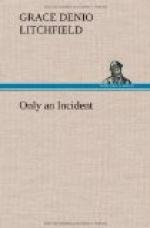And this was why when the Rev. Mr. Denham Halloway was called to the vacant parish of St. Joseph’s and fell down in its maidenly midst like a meteor from an unexplored heaven,—a young, handsome divine, in every way marriageable, though still unmarried, and in every way attractive, though still to the best of hope and belief unattracted,—this was why no girl of them all thought her own chances lessened in the least when he and Phebe became such friends. No one gossiped. No one ah-ah’d, or oh-oh’d. No one thought twice about it. What difference could it make? If it had been anybody else now! But it was only Phebe Lane.
CHAPTER II.
Phebe.
“Miss Phebe!”
“Oh, Mr. Halloway!”
“Hush. Don’t let them know I’m here. I couldn’t help peeping in as I went by. You look done up.”
“I am.”
“What’s going on?”
“Come in and see.”
“Heaven forbid! Gracious! Mrs. Upjohn
will think that’s a swear.
Don’t look this way, Miss Phebe. They’ll
discover me. What’s Mr.
Hardcastle saying?”
“The world is very evil.”
“‘The times are waxing late.’ Why doesn’t he add that and go?”
“He never goes. He only comes.”
“What is Mrs. Upjohn so wrought up about?”
“She caught one of her Sunday-school boys breaking Sunday.”
“How?”
“Eating apples.”
“Horrible! Where?”
“Up in a tree.”
“Whose tree?”
“That’s where the unpardonable comes in. Her tree.”
“Poor boy; what a mistake! What are you doing with that hideous silk stocking?”
“Picking up dropped stitches.”
“Whose stitches? Yours?”
“Mrs. Hardcastle’s.”
“Don’t aid and abet her in creating that monstrosity. It’s participation in crime. It’s worse than eating apples up a tree. Do you always have such a crowd here in the morning?”
“Always.”
“How long have they been here?”
“Nearly two hours.”
“What do they come for?”
“Habit.”
“Miss Lydia’s asleep.”
“Habit too.”




